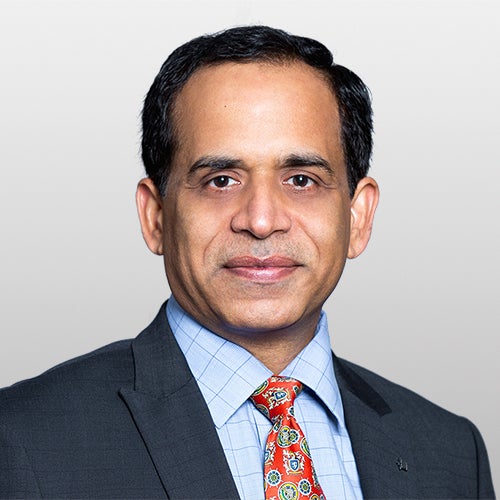
“India’s growth, fuelled by digital transformation, robust consumption, and expanding exports, makes it one of Asia’s fastest-growing economies, offering a multi-year investment opportunity.”
Shekhar Sambhshivan
India is emerging as Asia’s new engine of economic growth. With GDP expanding at over 6%1, the country is steadily narrowing its nominal GDP gap with Japan and is on track to become the world’s fourth‑largest economy. We see India’s future growth anchored by three key secular drivers: Financialization of savings, Consumption Explosion, and Manufacturing Renaissance.
This actively managed fund is positioned to benefit from India’s strong economic growth, and in particular from the underlying secular growth trends, by investing in corporations that exhibit ‘quality growth’ features. These are companies with strong management, sustainable earnings growth, flexible cost metrics, a strong balance sheet, a strong brand as well as significant market share. The fund is not managed in reference to a benchmark.
The investment team stands out as one of the most seasoned teams with an impressive 19-year track record under consistent leadership. The fund manager Shekhar Sambhshivan has been managing the fund since 2006 through various market cycles.
The fund is SFDR Article 8 classified, while many peers are not.
Access the Invesco India Equity Fund product page to view KIDs/KIIDs and factsheets. The investment concerns the acquisition of units in an actively managed fund and not in a given underlying asset.
Any investment decision should take into account all the characteristics of the fund as described in the legal documents. For sustainability related aspects, please refer to www.invescomanagementcompany.lu. Any investment decision should take into account all the characteristics of the fund as described in the legal documents. For sustainability related aspects, please refer to www.invescomanagementcompany.lu
Fund manager Shekhar Sambhshivan has managed the fund since 2006 and leads a highly consistent and experienced team.
Favourable Market environment: An investment in Indian equities can capitalise on falling yields, structural reforms and controlled inflation.
Well positioned for a big reset of global dynamics: India benefits from a big global reset with dynamics and potentially maintain India economic stability.
Reforms and initiatives benefitting local businesses: India’s government-initiated improvements in the country’s infrastructure, reforms around corporate taxes and manufacturing, and the country’s ambitious renewable energy targets should bode well for corporate India’s growth prospects.
Favourable demographics: The share of India’s working age population to total population is expected to reach 65.2% in 2031. With a relatively young population, India not only gets a competitive advantage in terms of workforce but also an opportunity to unleash the consumption power of a young population. (Source: The Economic Times, Sept 2024 Working-age Indian population rising; expected at around 64% in next census: SBI Research - The Economic Times)
India’s economic growth stands out on the global stage. We currently see opportunities specifically in three secular growth trends which are
SFDR is the acronym for Sustainable Finance Disclosure Regulation and its main purpose is to reorientate capital towards more sustainable businesses and increase transparency on sustainability among financial institutions and market participants. The SFDR article 8 classification applies to funds promoting environmental and social objectives and which take more into account than just sustainability risks as required by article 6.
You can invest in the Asian and emerging market stock markets by investing in actively managed mutual funds or exchange traded funds (ETFs). Invesco offers a broad range of actively managed funds and ETFs.


Let us know using this form and one of our specialist team will quickly get back to you.